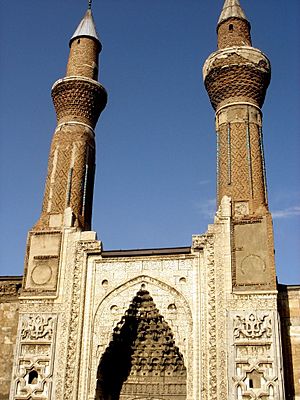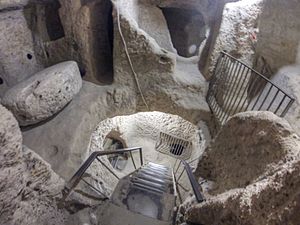Rum (endonym) facts for kids
Rūm is an old word that means "Roman." It comes from ancient languages like Aramaic, Parthian, and Greek. People living in places like modern-day Turkey, the Middle East, and the Balkans used this word to describe themselves. This was especially true when these areas were part of the Eastern Roman Empire.
Today, the word Rūm is used in a few ways:
- It describes Christian groups in the Near East (like Syria, Lebanon, and Turkey) whose families have lived there since before Islam. Many of them belong to the Greek Orthodox Church of Antioch. Their church services still use ancient Greek.
- It refers to Orthodox Christian people in modern Turkey. These include groups like the Pontians and Cappadocian Greeks.
- It's part of place names in Turkey (like Erzurum) and the Balkans (Rumelia). These names show the lasting influence of the Eastern Roman Empire. It also reminds us of the Seljuk Sultanate of Rûm, a medieval Muslim kingdom that ruled parts of central Turkey.
Contents
What Does Rūm Mean?
The word Rūm in Arabic and Persian comes from an older Persian word, hrōm. This word, in turn, came from the Greek word Ῥώμη (Rhōmē), which means "Rome." So, Rūm basically means "Rome" or "Roman Empire." Even in Armenian and Georgian, similar words for "Rome" came from these ancient roots.
Ancient Writings
You can find early versions of the word Rūm in ancient writings. For example, it's on the Ka'ba-ye Zartosht monument, which dates back to around 262 AD. This monument celebrates a victory by a Persian king named Shapur I over the Romans.
The word Rūm also appears in the Quran, a holy book of Islam, written in the 7th century. In the Quran, Rūm refers to the Eastern Roman Empire. This empire was the most powerful Christian state during the time of the Prophet Muhammad. The Western Roman Empire had already fallen about 200 years earlier.

The Quran even has a chapter called Ar-Rum, which means "The Romans." Today, some people translate this as "The Byzantines." The people of the Eastern Roman Empire in the 7th century called themselves Romaioi (Romans). This was because all people in the Roman Empire had become citizens by 212 AD. The word Romaioi became Rūm in Arabic.
To talk about people from the city of Rome in the West, Arabs used different words like Rūmān or Lātīniyyūn (Latins). For European Greek speakers, they used Yūnāniyyūn (from Ionia, a name for Greece). It's important to know that the word "Byzantine" was not used at the time. Historians use it today to describe the Eastern Roman Empire.
For about 600 years, the Roman Empire, and later the Eastern Roman (Byzantine) Empire, controlled the entire eastern Mediterranean. But after Islam began in Arabia in the 7th century, Muslim armies conquered lands like Syria, Egypt, and Libya. The Byzantine Empire became much smaller, mostly just Anatolia (modern Turkey) and the Balkans.
The Seljuks, who formed the Sultanate of Rum, took their name from ar-Rum. This was the word for the Romans in the Quran. Later, in the 15th century, the Byzantine Empire finally fell to the Ottoman Turks. These Turks had been moving into what is now Turkey from Central Asia since the 12th century.
So, during the Middle Ages, Arabs called the people of Turkey, the Balkans, Syria, Lebanon, and Palestine "Rûm." They called these lands "the land of the Rûm" and the Mediterranean Sea "the Sea of the Rûm."
After the fall of Constantinople in 1453, the Ottoman Sultan Mehmed II declared himself the new "Kayser-i Rum." This means "Caesar of the Romans." Under the Ottoman system, the conquered people of Turkey and the Balkans were called the "Rum Millet." This meant they were grouped together for taxes and were allowed to keep practicing Orthodox Christianity.
Today in Turkey, Rum still refers to the Orthodox Christian minority. It also refers to their old religious organizations, like the Ecumenical Patriarchate of Constantinople in Istanbul. This is the main leader for all Orthodox Christians.
Rūm in Geography
Muslims often met the Byzantine Empire in Asia Minor, which is mostly modern Turkey. This area was the heart of the Byzantine state for a long time. Because of this, the word Rûm became strongly linked to this region.
Even after the Seljuk Turks conquered central Turkey in the Middle Ages, the name stuck. The Turks called their new state the Sultanate of Rûm, meaning "Sultanate of the Rome."
Later, when the Ottomans conquered the Balkans, they called the area Rumelia. This means "Roman lands," because many of the newly conquered people there were called Rûm by the Ottomans.
Rūm as a Name
The name Al-Rūmī is used to describe people who came from the Eastern Roman Empire or lands that used to be part of it. This is especially true for people from modern Turkey. Famous people with this name include:
- Suhayb ar-Rumi: A companion of the Prophet Muhammad.
- Rumi: A famous 13th-century Persian poet. He lived most of his life among the Rûm (Byzantines) in Konya, which was part of the Sultanate of Rûm.
- Qāḍī Zāda al-Rūmī: A mathematician from the 14th century.
The Greek last name Roumeliotis also comes from the word Rûm.
Other Uses of Rūm
In the 16th century, the Portuguese used rume to describe the Muslim forces they fought in the Indian Ocean.
The term Urums is still used today for Greek people who speak Turkic languages. "Rumeika" is a Greek language spoken mainly by Ottoman Greeks.
The Chinese during the Ming dynasty called the Ottomans Lumi, which came from Rum or Rumi. Later, during the Qing dynasty, they called Rum Wulumu.
Among Muslim nobles in South Asia, the fez (a type of hat) is known as the Rumi Topi. This means "hat of Rome or Byzantium."
Before Islam, in the Sassanian Empire (ancient Persia), the word Hrōmāy-īg meant "Roman" or "Byzantine."
See also
 In Spanish: Rūm para niños
In Spanish: Rūm para niños
- Ayrums, a Turkic tribe whose name comes from Rûm
- Urums, a Greek-speaking Turkic people
- Edirne Ciğeri, a meat dish from Turkey also called "Rumeli Ciğeri"
- Erzurum, a city name meaning 'Land of the Romans' in Arabic
- Hayhurum, Greek Orthodox Armenians of Turkey
- Rûm Eyalet
- Rumelia, meaning 'country of the Romans' in Turkish
- Rumi calendar, a calendar used by the Ottoman Empire, based on the Roman Julian calendar
- Rumiye-i Suğra, or Little Rûm, a region in the Ottoman Empire
- Rumçi, another term for Greek Orthodox people during the Ottoman Empire
- Romaniote Jews
- Succession of the Roman Empire
- Baciyan-i Rum
 | Madam C. J. Walker |
 | Janet Emerson Bashen |
 | Annie Turnbo Malone |
 | Maggie L. Walker |


